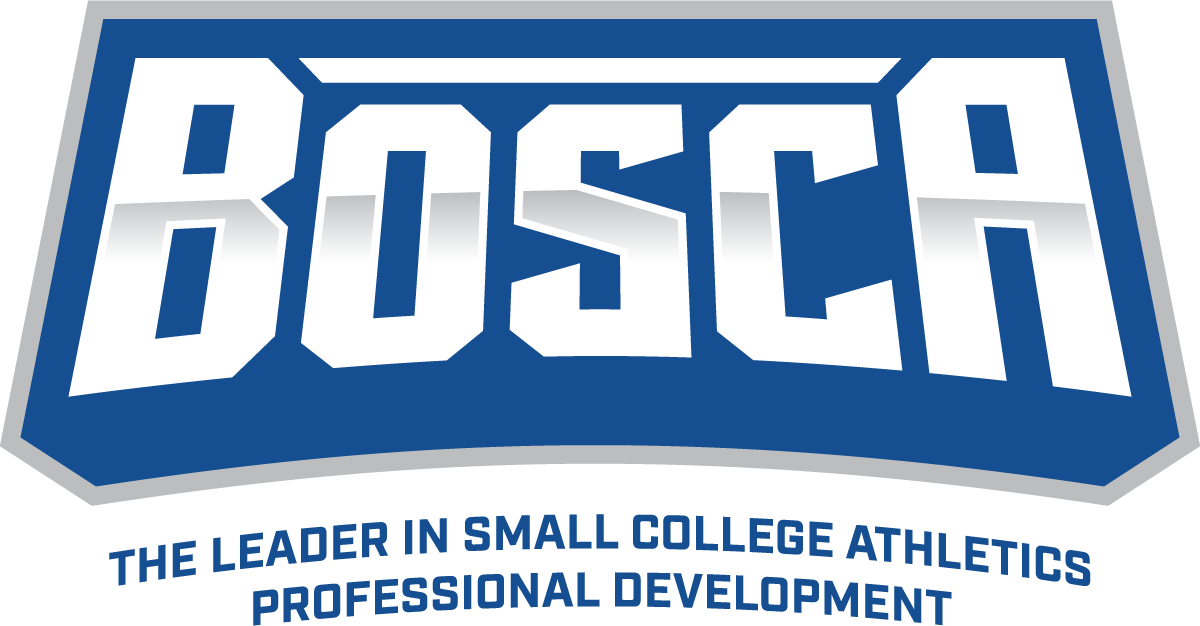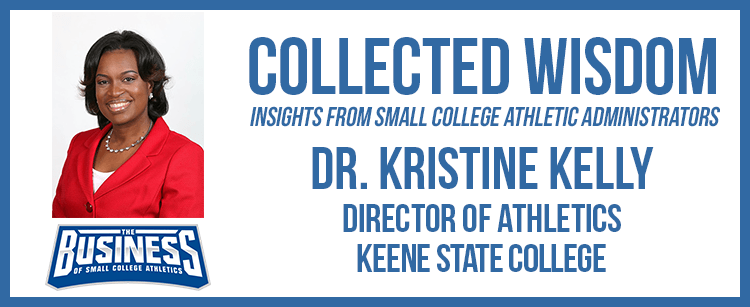Collected Wisdom - Dr. Kristine Kelly
Athletic Director - Keene State College
Collected Wisdom is a series of interviews featuring insights from small college athletic administrators. Our thanks this week to Dr. Kristine Kelly, Athletic Director at Keene State College for sharing her time and expertise.
How did you get started in College Athletics? Believe it or not, my work-study assignment was the department of athletics as an office assistant during my freshman year and it just blossomed from there. From making copies to doing the scoresheets for volleyball, to typing football game plans to working on operations (travel, meals, expense reports) for men’s basketball, to being the statistician for both basketballs and finally as a student athletic trainer for the football team.
You started your career in athletics as a
Sports Information Director? What
experiences did you have in that position that impact the decisions you make as
an Athletic Director now?
Obviously, the need for sports information
personnel assistance, lenient on work hours, as well as the need to “tell” our
story. Sometimes, ADs are so busy and far removed from the day-to-day grind, we
forget the demands of this 24/7 profession. I know what it’s like to be up long
after everyone has gone home and I’m writing stories, updating the websites,
etc.
What was the one thing you were least prepared to do when you became an Athletic Director? Least prepared? I would say probably budgeting. I came from two small private schools where the budget was basically dictated to us. I understood how to work within those confines but the actual budgeting process was foreign because we never had to develop and/or defend our budgets at those schools. Having transitioned to a state school, that’s a totally different ball game. I am extremely thankful for my athletics business manager, her ability to be patient with me and teach me as well as me being a quick learner. J
What advice do you have for
SID’s, Asst. A.D.’s that desire to someday become an Athletic Director?
You
must develop relationships within the industry. Also, make sure people know you
and what your goals are. People can’t help you get to that ADship if they don’t
know. Additionally, particularly for SIDs, is to think and communicate
strategically and don’t be so pigeon-holed. Don’t just say: I need this new
software. Show how it could enhance the program as a whole or how it could be a
cost-savings measure, etc. Many times, SIDs only think about their shop and not
the entire department.
You are involved with the Women
of Color Athletic Director Network, how did this get started and what does this
group do?
China Jude, Senior Associate AD/SWA at the University of Wyoming,
was the mastermind behind this initiative. The Women of Color AD Network provides
women of color athletic directors the opportunity to dialogue and strategize
about issues that impact the athletics industry. The WoC AD Network promotes
mentorship, influences policy and engages in advocacy for women of color in
senior executive leadership positions.
Can you remember a program/idea that you tried that just didn’t work? Yes, I scheduled a mentor of mine to speak at a retreat. This person is skilled, knowledgeable and thorough, but it was not the right fit for our department. I heard about it for a few days every which way I turned. As a leader, I sent a message acknowledging the mistake and that suppressed the “water cooler” conversations (thankfully).
What is your favorite part of your job? My favorite part of the job is seeing our athletes and coaches in their respective spaces during competition. Seeing them achieve success knowing what it took to get to that point. I must admit, as a former SID, when I get to post videos and photos on Twitter or Instagram of our athletes during competition, it allows me to still have a little piece of that SID life. Most times, they like my posts or comment on it and that makes me feel good.
Who are some of your mentors/people that have encouraged you along the way? Sooooo many people but besides my family, Dr. Dorothy Cowser Yancy – president emerita at Johnson C. Smith and Shaw Universities, the late Daryl McNeill, Sr. (former head football coach at several universities but Asst AD at JCSU), Dr. Dianne Boardley Suber – president emerita at Saint Augustine’s University, Jacqie McWilliams – Commissioner of the CIAA, Tonia Walker, Ingrid Wicker-McCree, Dianthia Ford-Kee, all ADs at Winston-Salem State University, North Carolina Central University, Mississippi Valley State University and Monique AJ Smith – CEO of Seeds of Empowerment. There are countless others as well.
Best career advice that you
have received?
Bloom where you are planted but go where you are celebrated
and not tolerated. Take advantage of the opportunities you have in your present
position. However, if your value and contribution to the department or organization
is not appreciated, it may be time for you to assess if the current workplace
culture is right for you.
What advice do you have for
young people that are looking to start a career in college athletics?
Be
good at what you do, whatever it is that you are doing. All jobs won’t come in
a shiny box with a bow. Don’t be afraid to step outside of your comfort zone
and take advantage of all professional opportunities. Take that internship in
compliance, even though your background may be event management. Work hard, be
thorough, the ability to communicate (both orally and in writing).
What is the most challenging part of your job? The demand to do more with less. The need for better facilities, more support services, etc continues to increase while the level of support decreases. 85% of our budget is derived from student fees so we are very, very enrollment driven. If enrollment drops, so does our funding.
What are 1-2 qualities that
you look for when hiring a head coach?
Organizational skills (so much of
being a collegiate head coach is NOT about X’s and O’s), personality, 21st
century thinking, confidence, the ability to communicate with, relate to and
motivate young people.
How do you balance your personal
and professional life?
I am present wherever I am. If I’m at work, I am
fully present there. The same for personal time with my husband and son. My
husband has about 45 minutes between jobs so I know between 2:15 and 3pm, it’s
our time to talk on the phone. My son plays basketball so I make sure to plug
those games into my calendar so that I can be present. Lastly, I make time to
work out and take care of me. So at 5:30am, almost every morning, that’s my
“me” time .
You were an active participant in #scachat on Twitter in the past. What are your reflections on the chat and Small College Athletics professional development in general? I absolutely love the #scachat and I’m glad it has made its way back. It’s a place for small college administrators to chat and connect and realize that many of us are more alike than we are different. I truly enjoy networking and picking the brains of other professionals. My hope is to be able to attend the BOSCAconference in the fall.


